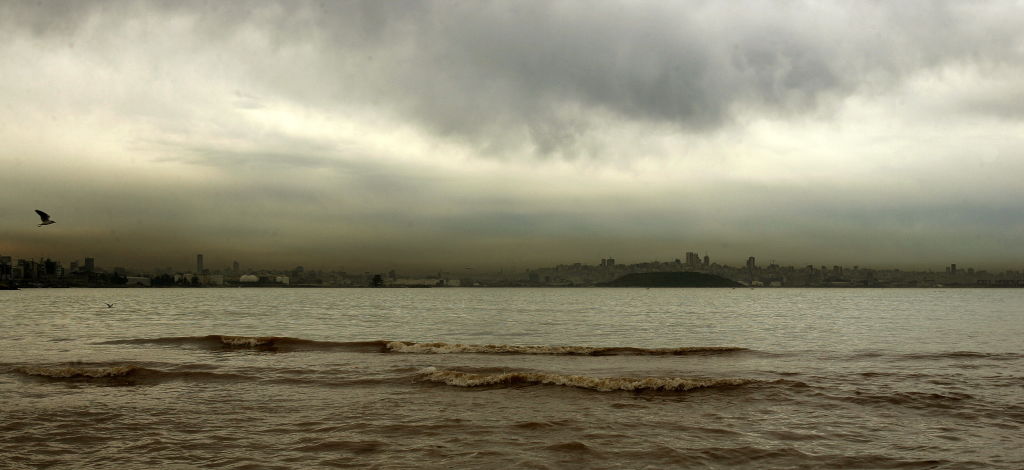Arab Barometer, which has been tracking the views of ordinary citizens across the Middle East and North Africa since 2006 and is the longest-standing and largest repository of publicly available data on those views, recently completed its seventh round of polling in the region. The data was collected between October 2021 and July 2022 and is based on face-to-face interviews with thousands of citizens across the 10 countries polled.
The Middle East Institute, in partnership with Arab Barometer, is pleased to present a series of panel discussions bringing key findings of the polling data to the public. The third of this series features a presentation by Mohamed Abufalgha, Research Data Specialist at Arab Barometer, on attitudes toward the environment and climate change. Alicia Dauth, an Associate Environmental Consultant at AESG, and Malak Altaeb, a Non-Resident Scholar at MEI, will respond to the data in conversation with moderator Mohammed Mahmoud, the director of MEI’s Climate & Water Program.
The first of these events featured a presentation on attitudes toward the U.S., China, and Russia, as well as major regional actors Saudi Arabia, Turkey, and Iran; the second focused on food insecurity across the MENA region and its discontents. The final, upcoming panel will present Arab Barometer findings on regional attitudes regarding gender.
Speakers
Mohamed Abufalgha
Research Data Specialist, Arab Barometer
Malak Altaeb
Non-Resident Scholar, Middle East Institute
Alicia Dauth
Associate Environmental Consultant, AESG
Mohammed Mahmoud, moderator
Senior Fellow; Director of the Climate & Water Program
Detailed Speaker Biographies
Mohamed Abdufalgha
Mohamed Abufalgha is a Research Data Specialist at Arab Barometer. He is responsible for assisting the AB team in completing data validation, producing data visualizations, and conducting statistical analysis of AB survey data. Prior to joining the research network in 2020, he graduated with a Master’s degree in global policy studies from University of Texas, Austin. He has previously worked on Syrian Palestinian refugee issues in the Middle East and Europe.
Malak Altaeb
Malak Altaeb is an independent consultant, writer, and researcher based in Paris, France. She is an Environmental Policy master’s graduate from Sciences Po in Paris, with a bachelor’s degree in Chemical Engineering from the University of Tripoli, Libya. She currently works as an information analyst with Storyzy in Paris, where she conducts in-depth analysis of the digital ecosystem with a focus on the MENA region.
Alicia Dauth
Alicia is an Associate Environmental Consultant at AESG. She comes with an international set of environmental credentials and work experience throughout the U.S., Africa, and the Middle East, providing clients with instrumental environmental consultancy and water-quality monitoring services. Alicia supported international embassies and NGOs in Southern Africa to raise awareness for improving the sustainability agenda throughout the region. She has engaged with multiple stakeholders to unlock sustainable management and feasibility practices to achieve cost-effective solutions within Zimbabwe. Alicia has been involved with the design and implementation of a working geodatabase to spatially record and highlight environmental discrepancies. She managed a robust water management system within remote environments ensuring safe water distribution, storage, and disposal through bioremediation applications in Hwange National Parks, Africa. Her working knowledge includes water and soil monitoring for a variety of site development activities specifically for contaminated lands. Her involvement with site remediation of contaminated soils and groundwater challenged her to operate in complex environmental situations while reporting to California regulatory bodies. She is also an IEMA Full member and Chartered Environmentalist.
Mohammed Mahmoud
Mohammed Mahmoud is the Director of the Climate and Water Program and a Senior Fellow at the Middle East Institute. His areas of expertise include climate change adaptation, water policy analysis, and scenario planning. Mohammed has held leadership positions in several organizations: most recently as Chair of the Water Utility Climate Alliance; prior to that, Mohammed was President of the North American Weather Modification Council. Mohammed’s professional accomplishments include negotiating and formalizing a 10-year multi-state cloud seeding funding agreement between seven Colorado River Basin states, developing and implementing the first ever climate adaptation plan for a multi-county water district in Arizona, and helping secure a $1.1 million grant from NASA for Arizona State University to study the impacts of climate change on the hydrology of the Western United States. Mohammed has conducted water management research and work for the Middle East and North Africa region, most extensively on the Nile River Basin. His research on the Nile River Basin focused on the development of water resources in the Basin, analysis of Nile water-sharing agreements, and solutions for current and future challenges in the Nile River Basin. Mohammed’s other water management work in the region explored formalizing the administration of Saudi Arabia’s groundwater resources by using other established groundwater management frameworks as application templates; such as Arizona’s 1980 Groundwater Management Code.
Photo by Joseph Eid /Getty Images












